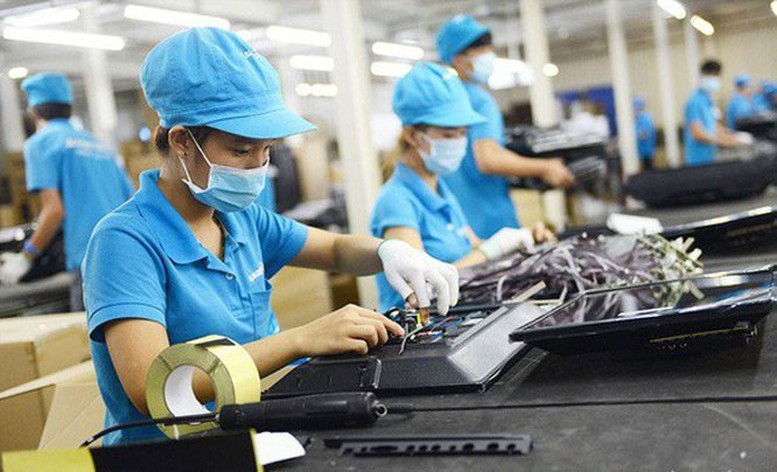52,800 Vietnam businesses temporarily suspend operations in Jan: What do the numbers mean?

The fact that over 52,800 businesses temporarily suspended operations in January isn't just a temporary economic blip; it may point to deeper, underlying issues within the business environment, writes Dr. Nguyen Si Dung, former Vice Chairman of the National Assembly Office.

Dr. Nguyen Si Dung, former Vice Chairman of the National Assembly Office. Photo courtesy of Thanh Nien (Young People) newspaper.
According to the General Statistics Office, in January, Vietnam saw notable fluctuations in the business landscape. Over 52,800 businesses temporarily suspended operations, up 20.2% year-on-year. Meanwhile, the number of businesses completing dissolution procedures decreased by more than 5,500 compared to January 2024.
Meanwhile, nearly 33,500 businesses joined the economy in the month, including 10,700 new businesses and 22,000 that returned to operation. The total additional registered capital reached over VND367,200 billion ($14.5 billion), a nearly 158% increase from the previous year.
However, the registered capital of new businesses dropped to VND95,000 billion ($3.75 billion), a decline of over 39% compared to 2024, with the average registered capital of a new business standing at around VND8.8 billion ($347,688), down from VND10.1 billion ($399,052) the previous year.
In addition, 34,200 new business households were licensed to establish themselves in January, with total registered capital of nearly VND8,500 billion ($335.8 million) and more than 58,500 employees. These figures paint a diverse economic picture, showing a strong rise in businesses exiting the market while simultaneously highlighting signs of recovery with new businesses and returning companies.

Workers at an electronocs firm in Vietnam. Photo courtesy of the government's news portal.
The significant increase in businesses leaving the market is a worrying signal. The fact that over 52,800 businesses registered to temporarily suspend operations in January, a 20.2% increase year-on-year, raises serious concerns about the health of the economy.
This trend not only reflects the challenges businesses are facing but also negatively impacts economic growth, the labor market, supply chains, investment conditions, and long-term development opportunities.
The sharp increase in businesses ceasing operations could result in slower GDP growth since businesses, especially in the private sector, are the primary drivers of value-added production. A wave of corporate closures could lead to decreased aggregate demand and investment, ultimately affecting production and consumption. If this trend continues, the economy could struggle to maintain sustainable growth.
Furthermore, the impact on the labor market would be significant. When a business shuts down, it’s not just the business owners who suffer; hundreds of workers lose their jobs, which leads to lower incomes, reduced purchasing power, and more strain on the social security system. With each business employing an average of 10 people, this wave of 52,800 closures could leave more than 500,000 people at risk of unemployment.
This phenomenon doesn’t just affect the businesses directly involved - its ripple effect extends throughout the supply chain. When a company shuts down, its suppliers, partners, and customers also face negative consequences, raising the risk of widespread bankruptcy. Lessons learned from the 2020-2021 period, when many businesses closed due to Covid-19, show that disruptions to the supply chain can almost bring an economy to a standstill.
The growing number of businesses exiting the market also signals problems within the business environment. Rising operating costs - such as electricity, bank interest rates, and logistics costs - are eroding business profits and reducing competitiveness. Weak purchasing power across the economy is also making it harder for many businesses to stay afloat. Additionally, pressure from administrative procedures and difficulty accessing credit are further obstacles that make it harder for businesses to recover and thrive.
In addition to the short-term impacts, the wave of closures has long-term implications for attracting investment. An economy with a high rate of business closures will diminish investor confidence, particularly among foreign investors. If the business environment becomes unstable, foreign direct investment (FDI) may shift to other countries with more favorable conditions, such as Indonesia or Thailand, which would weaken Vietnam's long-term growth prospects.
In summary, the surge in businesses leaving the market is not just a temporary issue - it reflects deeper challenges in the business environment, purchasing power, operating costs, and competitiveness. Without timely and effective support measures, the economy could face serious consequences, ranging from stagnating growth and job losses to the risk of losing regional competitive advantages.
The increase in businesses suspending operations in January is a wake-up call, requiring the government to act swiftly and decisively. Over 52,800 businesses temporarily suspending operations is not merely a temporary economic fluctuation but may point to deep-rooted issues in the business environment. If the underlying causes are not identified and addressed, the economy will face substantial short- and long-term challenges.
First, it is essential to understand the root causes of this phenomenon. Objective reasons include the global economic recession, inflation, high input costs, or shifts in consumer behavior. However, internal issues - such as tax policies, complex administrative procedures, difficulties in accessing credit, or legal barriers - may also be contributing to the struggles businesses are facing. Without comprehensive analysis, proposed solutions may fail to address the core issues effectively.
Studying these causes will not only help the government better understand the situation but also provide a foundation for crafting policies that support businesses. For example, if high financial costs are a key issue, the government could consider offering preferential credit policies, debt deferrals, or interest rate reductions.
If administrative barriers are the major problem, streamlining business licensing processes and reducing unnecessary regulatory requirements could be key solutions. If weak purchasing power is limiting business revenue, initiatives to stimulate consumption may be necessary.
A deeper study of the business closure trend will also help the government make long-term strategic adjustments, support businesses in overcoming immediate challenges, and create a conducive environment for sustainable development. If this phenomenon reflects the economy's shift to a new model, the government needs to have policies to guide and support businesses in converting their business models and adapting to market changes.
More importantly, a prompt investigation into the causes, followed by timely policy responses, will bolster the confidence of the business community and investors. When businesses see that the government is responsive, listens to their concerns, and takes action, they are more likely to continue investing and expanding, rather than leaving the market. This also sends a positive signal to foreign investors, maintaining Vietnam's attractiveness in the global investment landscape.
In conclusion, the rapid increase in business closures is a serious issue that requires a quick and accurate policy response from the government. It is vital to conduct thorough research to determine the causes and then propose appropriate solutions to support businesses, improve the business environment, and maintain economic stability.
If no action is taken, the economy may face dire consequences and miss out on future growth opportunities.
- Read More
MUFG Bank signs its first sustainability-linked loan deal in Vietnam’s agriculture sector
Japan's MUFG Bank, Ltd. (MUFG) has signed a sustainability-linked loan (SLL) agreement with Angimex-Kitoku, an An Giang province-based Vietnam-Japan joint venture company specializing in rice cultivation, production, and processing.
Banking - Fri, October 31, 2025 | 3:29 pm GMT+7
Vietnam, UK elevate ties to comprehensive strategic partnership, outline 6 cooperation pillars
Vietnam and the UK have established a Comprehensive Strategic Partnership, outlining six key pillars of cooperation, including economic, trade, investment, and finance collaboration.
Economy - Fri, October 31, 2025 | 1:19 pm GMT+7
Central Vietnam hub Danang seeks private investment for urban railways
With plans for 16 urban railway lines spanning over 200 kilometers, Danang is prioritizing private investment to develop a modern public transport-oriented urban model.
Infrastructure - Fri, October 31, 2025 | 12:02 pm GMT+7
FPT Retail profit more than doubles in Q3 as deposits surge
FPT Digital Retail JSC (HoSE: FRT), a subsidiary of Vietnam’s FPT Corporation, reported strong Q3 results, with net revenue rising 26.3% year-on-year to VND13,110 billion ($497.9 million) and post-tax profit up 61% to VND266 billion ($10.1 million).
Companies - Fri, October 31, 2025 | 8:57 am GMT+7
Geleximco-led consortium wins approval for $870 mln urban project in central Vietnam
A consortium led by conglomerate Geleximco Group has received approval to develop a long-delayed urban complex in Gia Lai province, with total investment capital estimated at VND21.95 trillion ($834 million).
Real Estate - Fri, October 31, 2025 | 8:26 am GMT+7
Singapore seeks 'renewable fuel', nuclear ties
Singapore must be ready to support all promising pathways, from established technologies to novel options, in its bid to transition its fossil fuel-based energy sector to one that is clean yet affordable, said Minister-in-charge of Energy and Science and Technology Tan See Leng on Monday.
Southeast Asia - Thu, October 30, 2025 | 7:41 pm GMT+7
Indonesia’s palm oil production set to rise 10% in 2025
Indonesia expects palm oil production to grow by 10% in 2025, reaching 56-57 million tons, exceeding previous forecasts, according to the Indonesian Palm Oil Association (GAPKI).
Southeast Asia - Thu, October 30, 2025 | 7:27 pm GMT+7
Vietnam remains Lotte's key investment destination: exec
Lotte Group will continue to expand and diversify its business in Vietnam as a key investment destination, said chairman Shin Dong Bin.
Industries - Thu, October 30, 2025 | 7:17 pm GMT+7
Vingroup ventures into film, music industries with new subsidiary
Vietnam’s leading private conglomerate Vingroup (HoSE: VIC) has established a new subsidiary, V-Film JSC, marking its official entry into the entertainment sector spanning film, television, and music production.
Industries - Thu, October 30, 2025 | 5:18 pm GMT+7
Vietnam must speed up energy transition to meet net-zero goal: expert
Vietnam must pursue a fast but sustainable energy transition, built on science-technology, innovation, and international cooperation, to ensure energy security through 2045 and meet the net-zero 2050 goal, says Assoc. Prof. Dr. Dang Tran Tho, director of the Institute of Energy Technology under Hanoi University of Science and Technology.
Economy - Thu, October 30, 2025 | 2:26 pm GMT+7
Vietnam’s CNCTech becomes strategic investor in Japan-backed Dragon Logistics
Vietnamese industrial corporation CNCTech, through its subsidiary Dravico, has become a new strategic investor in Dragon Logistics, a Japan-backed joint venture.
Companies - Thu, October 30, 2025 | 1:35 pm GMT+7
Standard Chartered, HSBC raise Vietnam growth forecasts for 2025
Standard Chartered has raised its Vietnam GDP growth forecast to 7.5% for 2025 from the previous 6.1%, and to 7.2% for 2026 from 6.2%, following HSBC's revising up its prediction to 7.9% (from 6.6%) and 6.7% (from 5.8%), respectively.
Economy - Thu, October 30, 2025 | 9:44 am GMT+7
Vietnam parliament's resolution to allow more buyers under direct power purchase arrangements
The upcoming parliamentary resolution on mechanisms and policies to remove obstacles to national energy development for 2026-2030 will provide an open legal corridor that accelerates power grid and generation projects, writes Tran Hoai Trang, deputy director of the Electricity Authority.
Energy - Thu, October 30, 2025 | 9:00 am GMT+7
Tan Cang Offshore Services's Q3 profit triples on strong offshore demand, higher margins
Tan Cang Offshore Services JSC (UpCoM: TOS), a subsidiary of the military-run Saigon Newport Corporation, posted a threefold jump in Q3 net profit as offshore demand strengthened and margins improved.
Companies - Thu, October 30, 2025 | 8:05 am GMT+7
HCMC apartment prices keep climbing as supply shortfall persists
Apartment prices in Ho Chi Minh City show no signs of cooling as new supply remains tight and affordability continues to worsen, pushing buyers toward neighboring provinces, according to reports from Savills and CBRE Vietnam.
Real Estate - Thu, October 30, 2025 | 7:23 am GMT+7
Resolution 70: A 'pathway' for green energy in Vietnam
Resolution No. 70, issued on August 20, 2025 by the Politburo, Vietnam's highest decision-making body, is seen as a strategic “pathway” for green and renewable energy projects, ensuring Vietnam’s national energy security goals.
Energy - Thu, October 30, 2025 | 7:00 am GMT+7
- Infographics























